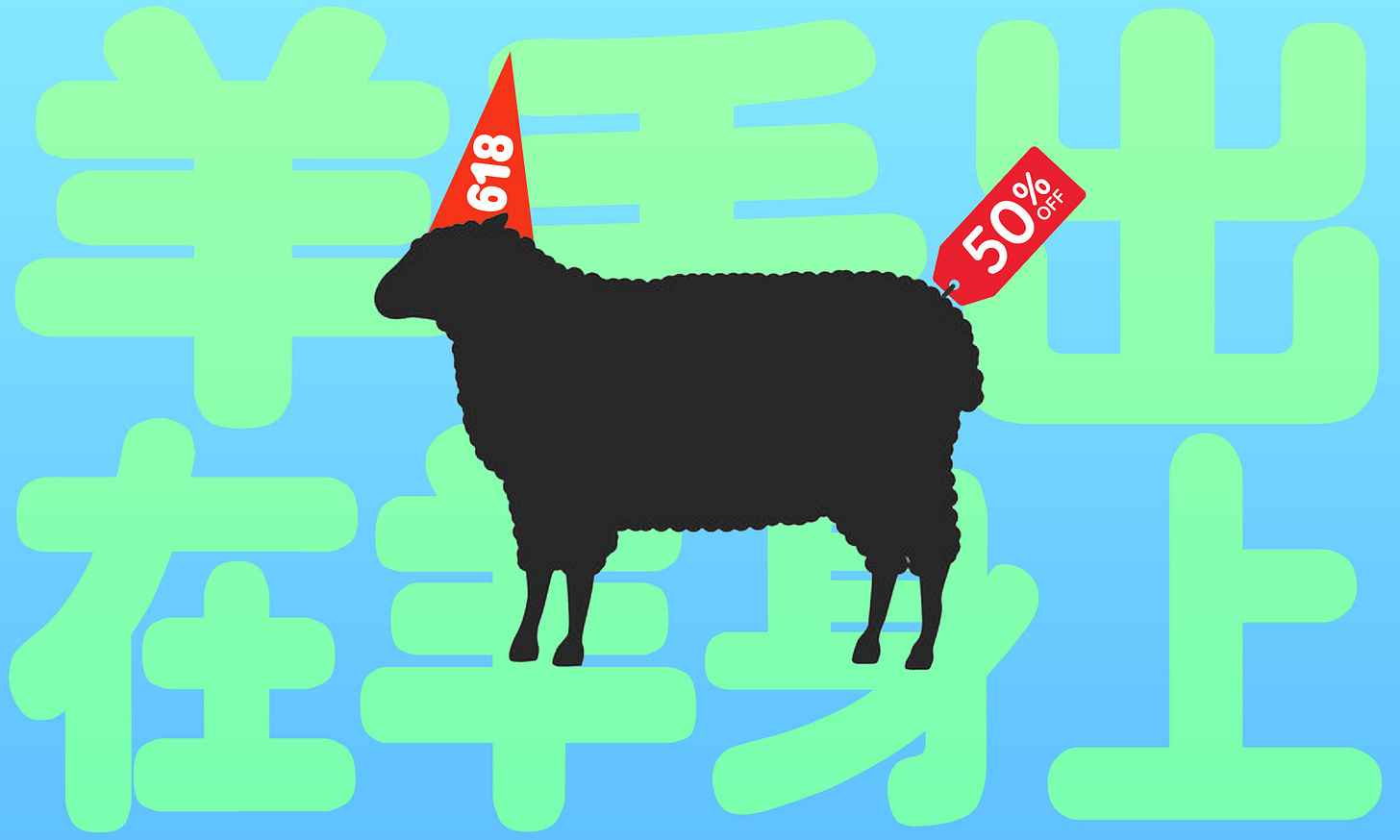Welcome to RealTime Mandarin—a multimedia resource to immerse you in the latest Chinese language trends, inspire you to practice and improve your Mandarin every week, and empower you to communicate with confidence.
Subscribe now to get the next issue straight to your inbox!
China has two main online shopping festivals each year.
The biggest is Double 11 (双十一 shuāng shí yī), Singles Day, also known as 光棍节 guāng gùn jié, which is held in November. It was conceived by Alibaba, and the first one was held in 2009.
The ‘618’ shopping festival (六一八 liù yāo bā in Chinese) is the second largest. It’s held in June, and was invented by JD.com to mark the anniversary of its founding on 18 June, 1996 (it first went online in 2004). JD.com is China’s second-largest e-commerce platform, behind Alibaba.
618 begins on 1 June and continues until the 18th, although this year it carried on until the 20th - finally drawing to a close last week.
As with every year, online e-commerce platforms were full of special deals, offers and discounts.
But this year, shoppers were quieter than normal.
即便预告期便竭力向外告知着“超大力度”,但战线越拉越长、规则越来越复杂的大促活动,并不能成功激起消费者的多巴胺,即便是往常一到大促就异常兴奋的“羊毛党”,对于今年的618也评价寥寥
Even though the promotional activities of platforms in the lead up were very strong, as the festival has become longer, and the rules become more complicated, these major shopping festivals cannot get consumers’ dopamine levels going. Even the big bargain hunters who are normally very excited had very little to say about it this year.
According to Sixth Tone, JD.com recorded a 10.3% rise in total sales from June 1 to June 18, marking its slowest growth of the past five years.
So this week we explore analysis about why China’s bargain hunters are not impressed this year, in one beautifully written article in 36Kr’s Burning Finance (燃财经 rán cái jīng) column.
Now, onto this week’s words….
Favourite Five
1. 被薅 bèi hāo
to be ripped off, taken advantage of
她觉得自己时间成本好廉价,“总感觉被薅的是我自己。” - She feels that her own time is seen as too cheap. She always feels like the one who is ripped off.
More: we discussed this word in April this year. It normally means to grab a discount, but in the passive (被) it means getting ripped off or taken advantage off by someone else who is looking for a discount at their expense.
Related: We also discussed the phrase 薅羊毛 hāo yángmáo in November last year. ‘Grabbing sheep’s wool’ means to grab a bargain.
2. 败北 bài běi
suffer a defeat
总之,‘羊毛车’得快,犹豫就会败北,只有果断才会白给 - Overall, if you are looking for a discount, you have to be quick. If you hesitate you will lose out; act fast and you can secure huge discounts.
More: the character 北 běi in ancient Chinese also has the meaning of 背 bèi, ‘to face your back towards’. During a military battle, when one side begins to weaken and has to retreat, it does so by turning round and running the other way - facing their backs to the imminent victors in doing so. So here 北 běi means to fail or lose. The term first appeared in Sima Qian’s work, Historical records: Biographic Sketches of Xiang Yu. (史记·项羽本纪).
More: 白给 bái gěi means to give a ‘huge discount’ or to get something for virtually free.
3. 羊毛党 yáng máo dǎng
sheep wool party; bargain hunters
和普通消费者不一样,“羊毛党”不太喜欢百亿补贴类的“直接低价” - Unlike other consumers, bargain hunters don’t really like the discounts based on big subsidies by brands.
Note: we first discussed this in November last year in the lead up to the Double 11 shopping festival.
More: you can also have bargain hunting groups on Wechat (羊毛群 yáng máo qún) and bargain hunting bloggers (羊毛博主 yáng máo bó zhǔ).
4. 工具人 gōng jù rén
a tool person; someone who is used by someone else to achieve an objective
工具人作为店铺及消费者中间的桥梁,消费者通过“工具人”链接获取相应商品更便宜 - The middle man is the bridge between the shop and the customer. The customer can buy products at much cheaper prices through them.
Note: this is an Internet phrase which became popular in 2020, voted a top ten hot phrase of the year. Here the meaning has evolved to something more like ‘middle man’.
5. 羊毛出在羊身上 yáng máo chū zài yáng shēn shang
wool comes from sheep; you get what you pay for
关于这个问题,仿佛那句“羊毛出在羊身上”已经让答案昭然若揭 - About this question, it would seem that the saying ‘wool comes from sheep’ has clearly answered it.
More: this is normally linked to someone being told they have got a good deal but actually they haven’t. They’ve just got what they have paid for already.
2. Consuming the conversation
Useful words
囤 tún
to stockpile
今年618原本想囤一年量的纸巾、洗衣液等一应家里日常用到的消耗品 - The plan for this 618 shopping festival was to stockpile a year’s supply of groceries such as tissues and shower gel.
大促 dà cù
big promotion
往常一到大促就异常兴奋的“羊毛党” - The bargain hunters usually become very excited around the time of big shopping promotions.
满减 mǎn jiǎn
discount after a certain amount reached
很多商家选择不参与平台的满减活动 - Lots of outlets have decided to not participate in the bulk buy deals of online platforms.
黑产 hēi chǎn
using bots to hunt bargains online
触碰法律红线的“薅羊毛”黑产的消费行为 - Bargain hunters who hunt bargains through the bots and illegal computer programs.
吆喝 yāo he
shout; publicity
消费者要想“薅”到羊毛,除了平台吆喝外,还需要商家让利 - If consumers want to get a good bargain, in addition to the platforms promoting it, the brands also need to give up some of their profits.
Note: this is a more colloquial/down to earth way of saying 宣传 xuān chuán.
战果 zhàn guǒ
the spoils of victory
活跃在羊毛群里的全职宝妈A姐最近半个月的“战果” - The spoils of victory from the last six months of full-time Housewife A who is very active in the bargain hunting online groups.
Note: 全职宝妈 quán zhí bǎo mā means ‘full-time housewife’; 宝妈 is short for 宝宝的妈妈 (bǎo bǎo de mā mā).
折戟 zhé jǐ
defeated
在此事上折戟的她,更是研究出一套“薅羊毛攻略” - She was duped on this, so she came up with her own bargain hunting strategy.
Related: 折戟沉沙 zhé jǐ chén shā - suffer a crushing defeat, which is an idiom we first explored in April this year.
割舍 gē shě
give up
如果发现营销所带来的收益不能覆盖投入成本,那么只能将之割舍 - If you realise the benefits of marketing cannot cover the cost of the discounts offered, then you should give it up.
Note: this is a more written way to say 舍弃 shě qì or 放弃 fàng qì.
蒙骗 mēng piàn
deceive
下单前也要擦亮眼睛不被蒙骗 - Before placing the order, you need to be sharp whether you are being conned.
Note: similar to 欺骗 qī piàn; mēng implies being kept in the dark.
Three-character phrases
捡便宜 jiǎn pián yi
get a benefit for very little effort
除了没“薅”上商家羊毛外,宋毛毛平台的“便宜”也没捡着 - As well as not getting any good bargains from brands, Song Maomao also could not get any good deals from the platforms either.















